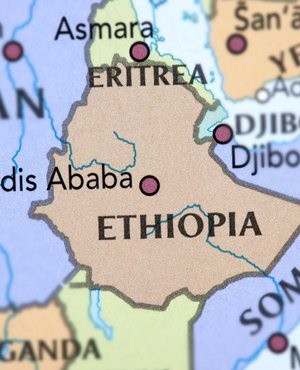Ethiopia has announced it will fully accept the terms of a peace agreement with neighbouring Eritrea in a major step toward calming deadly tensions with its decades-long rival, as dramatic reforms under a new prime minister continue.
The development on Tuesday night came as the ruling party also announced that the East African nation, one of Africa's fastest-growing economies, will open up parts of state-owned enterprises in sectors such as energy, aviation and telecoms to private investment and others, such as railways and hotels, to full privatization.
The news came just hours after Ethiopia lifted a state of emergency in what had been the biggest reform yet under new Prime Minister Abiy Ahmed, who has promised change after more than two years of deadly anti-government protests demanding greater freedoms in Africa's second most populous country.
But it is the prospect of peace with reclusive Eritrea that comes as the latest, and largest, surprise.
The peace agreement signed in 2000 ended a two-year border war that claimed the lives of tens of thousands of people, but a no-peace-no-war situation continued, with the two countries skirmishing from time to time. Ethiopia had refused to accept the deal's handing of key locations, including Badme, to Eritrea and continues to control that town.
Ethiopia's ruling party now accepts that agreement without conditions and calls on Eritrea's government to do the same, the state-affiliated Fana Broadcasting Corporate reported.
"The suffering on both sides is unspeakable because the peace process is deadlocked. This must change for the sake of our common good," the chief of staff for the prime minister's office, Fitsum Arega, said on Twitter.
Eritrean officials in Ethiopia's capital, Addis Ababa, could not immediately be reached for comment and Eritrea's information ministry had posted nothing on the development.
Tiny Eritrea is one of the world's most closed-off nations, ruled by President Isaias Afwerki since gaining independence from Ethiopia in 1993 after years of rebel warfare. Eritrea has become a major source of migrants fleeing toward Europe, Israel and African nations in recent years as human rights groups criticize its harsh military conscription laws.
When the 42-year-old Abiy was installed as Ethiopia's prime minister in April his inaugural speech mentioned the need for reconciliation with bitter rival Eritrea, raising hopes of peace.
"We are fully committed to reconcile with our Eritrean brothers and sisters and extend an invitation to the Eritrean government to start dialogue and establish rapport," he said in his address to Parliament.
Since Abiy took power his government has released several thousand prisoners and tensions in restive areas have dramatically declined. Foreign-based opposition parties have been invited to return home in an effort to create a national consensus in the country of nearly 110 million people.
But Ethiopia's economy had suffered as companies, including foreign ones, found themselves targeted in the anti-government protests. Tuesday's announcement on easing state-owned monopolies is "an effort to boost and modernize," the chief of staff said.






